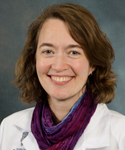The next phase of the study, now underway, focuses on how to create learning modules for fellows that can be applied in a patient-centric manner to help rheumatology program directors integrate education on health disparities into standard fellowship education. Dr. Blanco and her team are partnering with other organizations, including the ACR, to advance this phase of the study.
Rheum4Science
Based on a needs assessment survey of rheumatology program directors, Bethany Marston, MD, and colleagues found a substantial minority lacked the resources to provide optimal education in basic science and clinical research for their fellows. Program directors supported the creation of a web-based model that fellows can use to supplement standard learning, explains Dr. Marston, a rheumatologist and pediatric rheumatologist at the University of Rochester Medical Center, Rochester, N.Y.
To meet this need Dr. Marston and her team worked with content experts to develop an interactive online education program called Rheum4Science, which consists of a series of self-paced learning modules that meet the needs of adult learners in this population.
Six modules are available: Overview of Innate Immunity , Toll-Like Receptors in Rheumatic Disease , The NLRP3 Inflammasome , Data and Distributions , Cohort Studies and Pathogenesis of Rheumatoid Arthritis. Each module begins with a clinical case, followed by questions to consider through specific sections of content on the topic. The end of the module then returns to the case scenario to summarize key take-aways.
As part of the pilot, the Rheum4Science team wanted to understand if learners using the modules gained new knowledge, why learners opted to complete the modules and what their experiences were. Participants’ average content scores are around 44% prior to completing the modules, and 75% after. Around 90% of those who engaged did so to enhance their own knowledge, and the vast majority felt the modules were helpful.
“Clearly this project was well received, says Dr. Marston. “Participants almost universally expressed a desire for creation of additional modules and had other suggestions, including the creation of downloadable content.”
She wants to expand the modules to cover a broader content area, expand the pool of content experts and refine a process to keep modules updated as new evidence emerges. “We are hoping to turn [the program] into an enduring project through the ACR, and I look forward to transitioning to that arrangement in the future,” Dr. Marston says.
Learn more about Foundation awards and grants.




